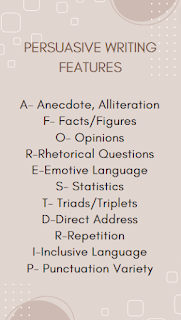Introduction:
Without wasting time today, I am diving straight into today's lesson which is quite crucial for FLE learners. In my last posts, I tried covering numerous mnemonics and acronyms such as GAPSS and ISHAMPOO https://www.teacherspayteachers.com/browse?search=ishampoo
for Directed Writing Questions such as journals, interviews and reports. If you are wondering what mnemonics are, well they are memory enhancers or memory devices and tools, that aid with learning educational concepts.
Mnemonics:
I will give a quick example here, say suppose the speech elements are chatty, conversational, engaging, interesting, personal, persuasive and illustrative. I can write or input these words in this mnemonic generator here: https://www.mnemonicgenerator.com/ or go to Google search engine and just put mnemonic generator. You will get numerous websites and apps to use. Next, put these words that you want to generate a mnemonic for. So, when I put the string of words such as chatty, conversational, engaging, interesting, personal, persuasive and illustrative, the mnemonic that comes out of it is the following:
'Creamy Curly Earthworms Inspected Prickly Pizzas Immorally'
So the first alphabets of the above set of words in the mnemonic is CCEIPPI which basically stands for 'chatty, conversational, engaging, interesting, personal, persuasive and illustrative'. So you see, it is quite a fun way to learn new points or just an easier way to learn things.
AFORESTDRIP:
This is the easiest, handiest and quickest way to learn the acronym for writing the most persuasive speeches. Acronyms are different from mnemonics. An example of an acronym is NASA. It is pronounced the same way it is spelt. AFORSTDRIP is an acronym for persuasive techniques and they are very helpful. Look at the following image of AFORESTDTRIP and save it for your reference and quick exam revision:
Examples: Supposedly the speech topic is to take up more volunteering work opportunities for teenagers and persuade them to do so. Following are the examples to help you understand them:
Alliteration: Work is Worship and Work is Wonderful. so volunteering is crucial.
Anecdote: My cousin started working for a charity at 16, and she gained immense experience as a caretaker, which helped her with her nursing college applications.
Facts: A recent study by Cambridge University claimed that teenagers who work after school hours are superior academically.
Figures: Recent educational surveys and research state that 90% of teenagers who take up unpaid work become master achievers later in life.
Opinions: In my opinion, teens should start working at an early age to understand the value of hard-earned money.
Rhetorical Questions: Why are we not preparing our teenagers for a world where the only way to earn respect is through working hard?
Emotive Language: Independent, free-willed and balanced adults are a result of hard-working teenagers. We should be proud of them.
Statistics: One in every ten teenagers do not work when they are still young which leads to them becoming lazier when they actually start their professional life.
Triads: Volunteering opportunities can be productive, lucrative and effective.
Direct Address: Teenagers, you must be aware that you can volunteer at your home too, helping mum in the kitchen or running errands.
Repetition: Working can lead to a confident mindset. Working can also lead to a calmer temperament. Working can lead to a generous heart.
Inclusive Language: We should all motivate and inspire teenagers around us to volunteer at charity shops, nursing homes, dental practices, food banks, etc.
Punctuation Variety: Most successful people in the world, prominently politicians, entrepreneurs, artists, etc. started to work at a very young age; this only adds to my stance of supporting teens working after school hours. It is the need of the hour!
Conclusion:
So, we learned the acronym AFORESTDRIP today and took up a sample speech writing prompt to understand it so that it can help you with writing better persuasive speeches.
The next post will be about a past paper question on speeches and how to incorporate these persuasive elements into a speech.
Until then, stay hooked to my blogs and do not forget to revise!




Comments
Post a Comment